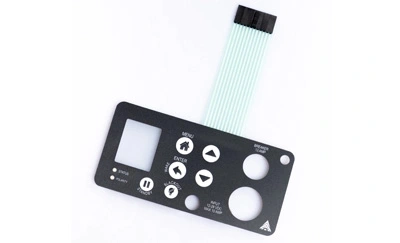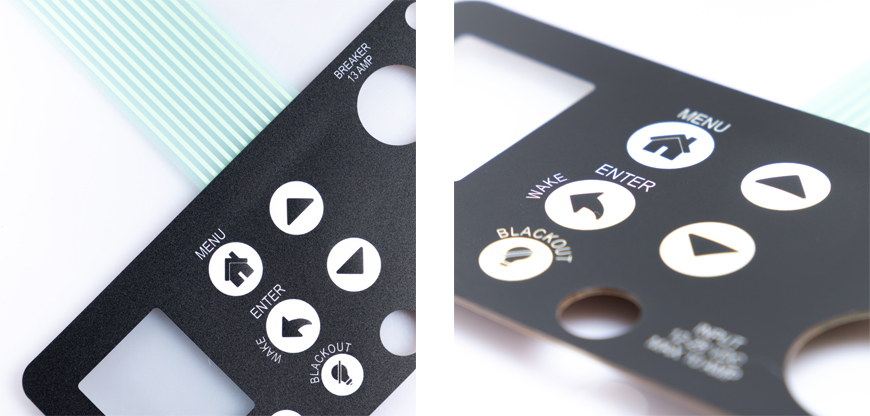
In today's rapidly advancing automotive industry, electronic membrane switches have emerged as a crucial component of modern car interiors. These sleek, intuitive interfaces have revolutionized the way we interact with our vehicles, providing convenience, safety, and aesthetics like never before. This article delves into the world of electronic membrane switches for cars, exploring their functions, benefits, and their impact on the driving experience.

1. Introduction: A Paradigm Shift in Car Interiors
2. Understanding Electronic Membrane Switches
3. How Electronic Membrane Switches Work
4. Advantages of Electronic Membrane Switches
· Improved Aesthetics
· Enhanced Durability
· Customizability
· User-Friendly Interface
5. Applications in Automotive Industry
· Dashboard Controls
· Infotainment Systems
· Climate Control
· Safety Features
6. The Future of Car Interiors
· Integration with Smart Technology
· Haptic Feedback
· Sustainable Design
7. Challenges and Limitations
· Environmental Concerns
· Maintenance and Repairs
8. Selecting the Right Membrane Switch
· Material Considerations
· Design Customization
· Quality Assurance
9. Installation and Maintenance
· Proper Installation Procedures
· Maintenance Tips
10. Safety Considerations
· Resistance to Harsh Environments
· Emergency Situations
11. Cost and Market Trends
· Cost Factors
· Growing Market Demand
12. The Evolution of Membrane Switch Technology
13. User Experience and Satisfaction
14. Conclusion: Shaping the Future of Automotive Interiors
15. FAQs: Your Questions Answered
The automotive industry has witnessed a remarkable transformation in recent years, with electronic membrane switches playing a pivotal role in reshaping the interior landscape of cars. Gone are the days of clunky buttons and knobs; today, we are greeted by sleek, touch-sensitive interfaces that offer a myriad of benefits.
Electronic membrane switches, also known as membrane keyboards or keypads, are thin, flexible, and pressure-sensitive devices that facilitate user interactions with various electronic systems. They consist of multiple layers, including a graphic overlay, adhesive spacer, and a printed circuit.
These switches rely on the principle of capacitance, detecting the change in electrical charge when a user's finger or a stylus interacts with the graphic overlay. This interaction triggers a response, activating the desired function, whether it's adjusting the volume, changing the temperature, or even starting the car.
Improved Aesthetics
One of the most notable advantages of electronic membrane switches is their ability to enhance the overall aesthetics of a car's interior. They allow for seamless integration into the design, creating a modern and sophisticated look.
Enhanced Durability
Despite their sleek appearance, these switches are incredibly durable, capable of withstanding harsh environmental conditions and heavy usage.
Customizability
Car manufacturers can customize the design, layout, and labeling of membrane switches, ensuring they align with the specific needs and branding of each vehicle.
User-Friendly Interface
The intuitive nature of membrane switches makes them user-friendly, reducing the learning curve for drivers and passengers.
Dashboard Controls
Membrane switches are widely used for controlling dashboard functions, including lights, wipers, and windows.
Infotainment Systems
They serve as the interface for infotainment systems, providing easy access to music, navigation, and connectivity options.
Climate Control
Electronic membrane switches make adjusting climate control settings effortless, enhancing comfort during journeys.
Safety Features
They play a crucial role in activating safety features like airbags and emergency lights, ensuring a quick response in critical situations.
As technology continues to advance, electronic membrane switches are poised to evolve further.
Integration with Smart Technology
These switches will integrate seamlessly with smart technology, allowing for voice commands and connectivity with mobile devices.
Haptic Feedback
Future switches may incorporate haptic feedback, providing tactile responses to touch, making the interface even more intuitive.
Sustainable Design
Car manufacturers are increasingly adopting eco-friendly materials in membrane switch production, contributing to a greener automotive industry.
While electronic membrane switches offer numerous advantages, they are not without challenges.
Environmental Concerns
The disposal of electronic components poses environmental concerns, necessitating proper recycling and disposal practices.
Maintenance and Repairs
In the event of malfunction, repairing or replacing membrane switches can be complex and expensive.
Choosing the right membrane switch for a car requires careful consideration.
Material Considerations
The choice of materials impacts durability and performance, making material selection a critical factor.
Design Customization
Car manufacturers must carefully plan the design and layout of switches to meet user needs and ergonomic standards.
Quality Assurance
Rigorous quality control measures ensure that membrane switches meet safety and reliability standards.
Proper installation and maintenance are essential to ensure the long-term functionality of membrane switches.
Proper Installation Procedures
Following manufacturer guidelines during installation is crucial to prevent issues down the road.
Maintenance Tips
Regular maintenance, including cleaning and inspection, can extend the lifespan of membrane switches.
Electronic membrane switches must meet safety standards to ensure their reliability.
Resistance to Harsh Environments
Switches should be resistant to extreme temperatures, humidity, and other environmental factors.
Emergency Situations
Reliable membrane switches are critical in emergency situations, where quick responses can save lives.
Understanding the cost factors and market trends is vital for car manufacturers.
Cost Factors
The cost of membrane switches can vary based on materials, customization, and quantity.
Growing Market Demand
The growing demand for advanced user interfaces in vehicles is driving the market for membrane switches.
As technology advances, so too will membrane switch technology, offering even more advanced features and capabilities.
Ultimately, electronic membrane switches contribute to a superior user experience and driver satisfaction.
Electronic membrane switches have redefined the way we interact with cars, offering a blend of aesthetics, functionality, and convenience that will continue to shape the automotive industry. As technology evolves, these switches will play an increasingly significant role in enhancing the driving experience.
Are electronic membrane switches compatible with all car models?
Electronic membrane switches can be customized to fit the requirements of different car models, making them adaptable for various vehicles.
Do membrane switches work in extreme weather conditions?
Many membrane switches are designed to withstand extreme temperatures and harsh environments, ensuring they function reliably in adverse weather.
Can I repair a malfunctioning membrane switch myself?
Repairing membrane switches can be complex and may require professional assistance to ensure proper functionality.
Are there any environmental concerns associated with membrane switches?
Proper disposal and recycling of electronic components, including membrane switches, are essential to address environmental concerns.
How do membrane switches contribute to the overall safety of a vehicle?
Membrane switches play a critical role in activating safety features such as airbags and emergency lights, enhancing vehicle safety.